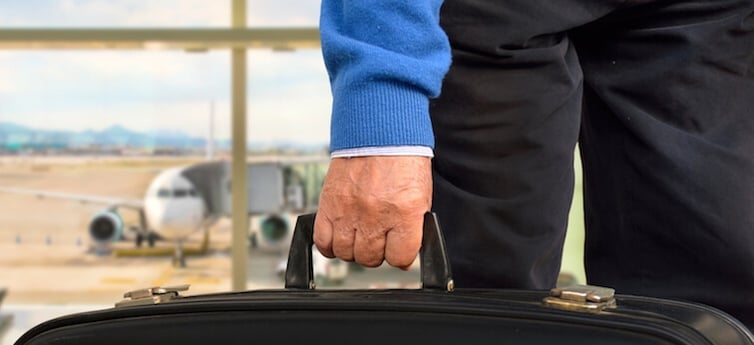
What You'll Learn

The arrival of summer means your travel dreams can finally come true. People of all ages are subject to wanderlust, and it is hard to dispute the sense of adventure and relaxation that comes from a trip. Science has recently started to back up those happy feelings that come from vacation, no matter if your trip is a few towns away or across the ocean. In 2013, a study published by the American Psychological Association noted that vacations can combat stress and negative emotions by removing us from our otherwise stressful lives. But the benefits of taking a vacation go beyond stress relief. A study out of the Wisconsin Medical Journal demonstrated that women who vacation twice a year are far less likely to suffer feelings of depression than women who vacation less that once every two years.
In short, vacations are important and aging adults can benefit from getting out and about for an adventure. If you plan on traveling with an older adult this summer, you might want to take the time to plan appropriately so that your trip together can be safe and enjoyable. The easiest way to make the vacation as smooth as possible is to plan ahead of time, long before you pack the car and head to the airport.
1. Consult Their Doctor
To begin traveling safely with a senior, you first need to consult a geriatrician. Make an appointment with your loved one’s doctor or call the office to see if there are any concerns or possible negative consequences of taking the trip. Most doctors are happy to provide advice and any potential travel contraindications. If you have the blessing of the doctor, you can begin planning your trip.
2. Don’t Forget Medication
Make sure you have all prescriptions ordered and ready to go for your trip. This can include calling the pharmacy to ensure you have all necessary refill orders, as well as double checking the expiration dates of any over-the-counter medications your loved one uses. Using a pillbox to keep medications straight can be a lifesaver (and a time-saver) on vacation, and you can fill up the individual boxes prior to leaving. Remember to fill a few extra days worth of medications as well, just in case there are any travel delays you did not plan on. Also, update your cell phone to reflect your loved one’s current pharmacy contact information as well as another pharmacy in the town you are visiting, in case you have a question or need a refill while on vacation.
3. Consider Accessibility
Make sure you have all the durable medical equipment your loved one may need for travel. Is your loved one’s cane or walker steady and easy to collapse? You may not need to travel with a wheelchair if your loved one only needs it for short distances. Many airports and destinations have wheelchairs available to rent.
When booking your accommodations, make sure your room is accessible and easy to navigate. Even seniors with no mobility issues can find hotel bathtubs or cramped rooms difficult to navigate safely. Call ahead to ask for a room that is accessible and provides grab bars in the bathroom.
4. Plan for Rest Stops
If traveling by car to your destination, plan for plenty of stops during your road trip. Not only do stops allow for bathroom breaks, it is also great for older adults to stretch their legs in order to avoid a potential blood clot. If you are traveling by air, encourage your loved one to walk a bit in the airport before you board and get up a few times during the flight as well. If your loved one’s legs become swollen, red or warm to the touch, go to the emergency room for follow-up care.
5. Prepare for Emergencies
Research the town you will be visiting ahead of time, noting the location and phone number of the closest urgent care center and emergency room. Put the information into your phone so you have it handy in case your loved one needs medical assistance.
6. Understand Memory Care Needs
If your loved one has cognitive concerns, be sure they are wearing a bracelet or necklace with your contact information on it in case they become separated from you. While it is a good idea to tuck your contact information into their purse or wallet as well, a medical alert bracelet is easier to find in times of confusion. For seniors living with dementia, late afternoon and evening hours can be difficult; if possible, plan a relaxing activity in the hotel room during this time, saving your bigger plans for earlier in the day.
Vacations are a wonderful way to create memories and escape the daily grind. Your senior loved one will love traveling with you, and you can rest assured the trip will go smoothly if you plan accordingly. Curious about what else your older loved one can look forward to in their retirement years? Download The Busy Person’s Guide to Recreation in Retirement to get the scoop.


